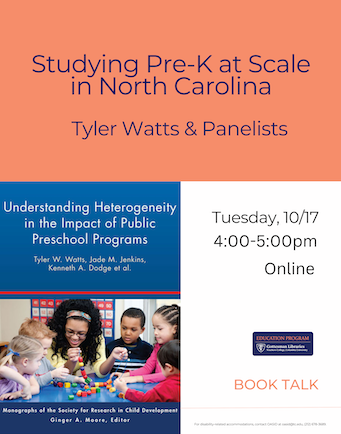Book Talk: Studying Pre-K at Scale in North Carolina, with Tyler Watts and Panelists
Please join Tyler Watts and colleagues for a presentation of and commentary on their recent publication, Understanding Heterogeneity in the Impact of Public Preschool Programs (ASCD, 2023). This latest addition to Monographs of the Society for Research in Child Development, seeks "to understand heterogeneity in the long-term impacts of a scaled-up statewide pre-k program, North Carolina's Pre-K (NC Pre-K) program that has demonstrated overall positive main effects. By identifying factors associated with long-term positive impact, we hope to inform theories of early learning, help pre-k program administrators improve their services, and guide policymakers on how to allocate future funding."
Abstract:
"We examine the North Carolina Pre-K (NC Pre-K) program to test the hypothesis that observed variation in effects resulting from exposure to the program can be attributed to interactions with other environmental factors that occur before, during, or after the pre-k year. We examine student outcomes in 5th grade and test interaction effects between NC’s level of investment in public pre-k and moderating factors. Our main sample includes the population of children born in North Carolina between 1987 and 2005 who later attended a public school in that state, had valid achievement data in 5th grade, and could be matched by administrative record review (n = 1,207,576; 58% White non-Hispanic, 29% Black non-Hispanic, 7% Hispanic, 6% multiracial and Other race/ethnicity). Analyses were based on a natural experiment leveraging variation in county-level funding for NC Pre-K across NC counties during each of the years the state scaled up the program. Exposure to NC Pre-K funding was defined as the per-4-year-old-child state allocation of funds to a county in a year. Regression models included child-level and county-level covariates and county and year fixed effects.
Estimates indicate that a child’s exposure to higher NC Pre-K funding was positively associated with that child’s academic achievement 6 years later. We found no effect on special education placement or grade retention. NC Pre-K funding effects on achievement were positive for all subgroups tested, and statistically significant for most. However, they were larger for children exposed to more disadvantaged environments either before or after the pre-k experience, consistent with a compensatory model where pre-k provides a buffer against the adverse effects of prior negative environmental experiences and protection against the effects of future adverse experiences. In addition, the effect of NC Pre-K funding on achievement remained positive across most environments, supporting an additive effects model. In contrast, few findings supported a dynamic complementarity model. Instrumental variables analyses incorporating a child’s NC Pre-K enrollment status indicate that program attendance increased average 5th grade achievement by approximately 20% of a standard deviation, and impacts were largest for children who were Hispanic or whose mothers had less than a high school education. Implications for the future of pre-k scale-up and developmental theory are discussed."
Tyler W. Watts is an Assistant Professor in Developmental Psychology at Teachers College, Columbia University. In addition to his work on North Carolina Pre-K, he has published numerous studies on the long-term effects of educational interventions. Tyler Watts previously worked as a Research Assistant Professor and Postdoctoral Scholar at New York University, and he received his Ph.D. in Education from the University of California, Irvine.
Jade Jenkins (study author) is an Associate Professor at the School of Education, University of California, Irvine. Dr. Jenkins' research interests cover Early Childhood Development, Child and Family Policy, and Program Evaluation. She earned her B.S. from University of Florida (2004) and her Ph.D. (2013) from the University of North Carolina, Chapel Hill.
Kenneth Dodge (study author) is the William McDougall Distinguished Professor of Public Policy and Professor of Psychology and Neuroscience at Duke University. He is also the founding and past director of the Center for Child and Family Policy, as well as the founder of Family Connects International. Dodge joined the faculty of the Sanford School of Public Policy in September 1998. He is trained as a clinical and developmental psychologist, having earned his B.A. in psychology at Northwestern University in 1975 and his Ph.D. in psychology at Duke University in 1978.
Eric Dearing (discussant/
Jackie Mader (moderator) is the Senior Early Childhood Reporter for The Hechinger Report. An award-winning journalist based in Austin, Texas, she currently covers early childhood education with an emphasis on policies and programs that impact young children and their families. She also writes a bi-weekly early ed newsletter for The Hechinger Report and supervises all multimedia elements of The Report. Her work has appeared in The New York Times, The Atlantic, USA Today, TIME and NBC News.
Following a presentation by the study authors, there will be commentary by panel discussants and audience Q&A.
Persons not affiliated with Teachers College, Columbia University may rsvp via online support. Use the drop down menu to select rsvp and enter your details so that an e-mail confirmation can be sent.
Members may use the registration button below.
Where: Online
To request disability-related accommodations, contact OASID at oasid@tc.edu, (212) 678-3689, as early as possible.
